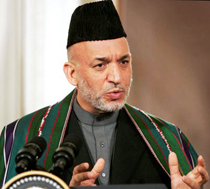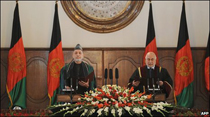Afganistanembassy.org
Government and politics of Afghanistan
Politics in Afghanistan has historically consisted of power struggles, bloody coups and unstable transfers of power. With the exception of a military junta, the country has been governed by nearly every system of government over the past century, including a monarchy, republic, theocracy and communist state. The constitution ratified by the 2003 Loya jirga restructured the government as an Islamic republic consisting of three branches, executive, legislative and judicial.
Corruption is many Afghans’ chief grievance against their leaders, pervading nearly all aspects of daily life. A number of government ministries are believed to be rife with corruption, including Interior, Education and Health. They either tolerate widespread malfeasance or have been powerless to stop it. A January, 2010 report published by the United Nations Office on Drugs and Crime revealed that bribery consumes an amount equal to 23 percent of the Gross Domestic Product (GDP) of Afghanistan. Afghans are forced by corrupt government culture to pay more than a third of their income in bribes.
 Afghanistan is currently led by the Karzai administration with Hamid Karzai as the President and leader since December 20, 2001. The current parliament was elected in 2005. Among the elected officials were former mujahadeen, Taliban members, communists, reformists, and Islamic fundamentalists. 28% of the delegates elected were women, three points more than the 25% minimum guaranteed under the constitution. This made Afghanistan, long known under the Taliban for its oppression of women, 30th amongst nations in terms of female representation. Construction for a new parliament building began on August 29, 2005.
Afghanistan is currently led by the Karzai administration with Hamid Karzai as the President and leader since December 20, 2001. The current parliament was elected in 2005. Among the elected officials were former mujahadeen, Taliban members, communists, reformists, and Islamic fundamentalists. 28% of the delegates elected were women, three points more than the 25% minimum guaranteed under the constitution. This made Afghanistan, long known under the Taliban for its oppression of women, 30th amongst nations in terms of female representation. Construction for a new parliament building began on August 29, 2005.
In November, 2009, Afghanistan slipped three places in Transparency International's annual index of corruption perceptions, becoming the world's second most-corrupt country ahead of Somalia. In January, 2010, President Karzai reinstated Gen. Abdul Rashid Dostum to a top army post despite Western demands for sweeping reform. Dostum is among Afghanistan's most notorious warlords, accused of widespread abuses including the massacre of thousands of Taliban prisoners.
Despite this, women in public life in Afghanistan are subject to routine threats and intimidation, according to a December, 2009 report by Human Rights Watch. Several high profile women have been assassinated, but their killers have not been brought to justice. When Sitara Achakzai, an outspoken and courageous human rights defender and politician, was murdered in April 2009, her death was seen as another warning to all women who are active in public life.
The 2009 presidential election in Afghanistan was characterized by lack of security, low voter turnout and widespread ballot stuffing, intimidation, and other electoral fraud. The vote, along with elections for 420 provincial council seats, took place on August 20, 2009, but remained unresolved during a lengthy period of vote counting and fraud investigation. Two months later, under heavy U.S. and ally pressure, a second round run-off vote between incumbent President Hamid Karzai and his main rival Abdullah Abdullah was announced for November 7, 2009. On November 1, however, Abdullah announced that he would no longer be participating in the run-off because his demands for changes in the electoral commission had not been met, and a "transparent election is not possible." A day later, on November 2, 2009, officials of the election commission cancelled the run-off and declared Hamid Karzai as President of Afghanistan for another 5 year term.
In the aftermath of the election, Peter Galbraith – a senior UN official in Kabul who was fired after pushing for the UN to reveal the extent of the preparation for fraud before the first vote – wrote that before the election, Karzai was seen as ineffectual and corrupt, and that now he was ineffectual, corrupt and illegitimate. Later that month, the U.S. ambassador in Kabul sent two classified cables to Washington expressing deep concerns about sending more U.S. troops to Afghanistan until President Hamid Karzai's government demonstrates that it is willing to tackle the corruption and mismanagement that has fueled the Taliban's rise.
In November, 2009, Afghanistan slipped three places in Transparency International's annual index of corruption perceptions, becoming the world's second most-corrupt country ahead of Somalia.
In January, 2010, President Karzai reinstated Gen. Abdul Rashid Dostum to a top army post despite Western demands for sweeping reform. Dostum is among Afghanistan's most notorious warlords, accused of widespread abuses including the massacre of thousands of Taliban prisoners.
 The Supreme Court of Afghanistan is currently led by Chief Justice Abdul Salam Azimi, a former university professor who had been legal advisor to the president. The previous court, appointed during the time of the interim government, had been dominated by fundamentalist religious figures, including Chief Justice Faisal Ahmad Shinwari. The court issued several rulings, such as banning cable television, seeking to ban a candidate in the 2004 presidential election and limiting the rights of women, as well as overstepping its constitutional authority by issuing rulings on subjects not yet brought before the court. The current court is seen as more moderate and led by more technocrats than the previous court.
The Supreme Court of Afghanistan is currently led by Chief Justice Abdul Salam Azimi, a former university professor who had been legal advisor to the president. The previous court, appointed during the time of the interim government, had been dominated by fundamentalist religious figures, including Chief Justice Faisal Ahmad Shinwari. The court issued several rulings, such as banning cable television, seeking to ban a candidate in the 2004 presidential election and limiting the rights of women, as well as overstepping its constitutional authority by issuing rulings on subjects not yet brought before the court. The current court is seen as more moderate and led by more technocrats than the previous court.
Keep in Touch
Contact Us
Address: 1050 17th, St.
Suite 600 N.W.
Washington, DC 20036
Tel: 202 347-5800
202 347-5800
info@afganistanembassy.com
